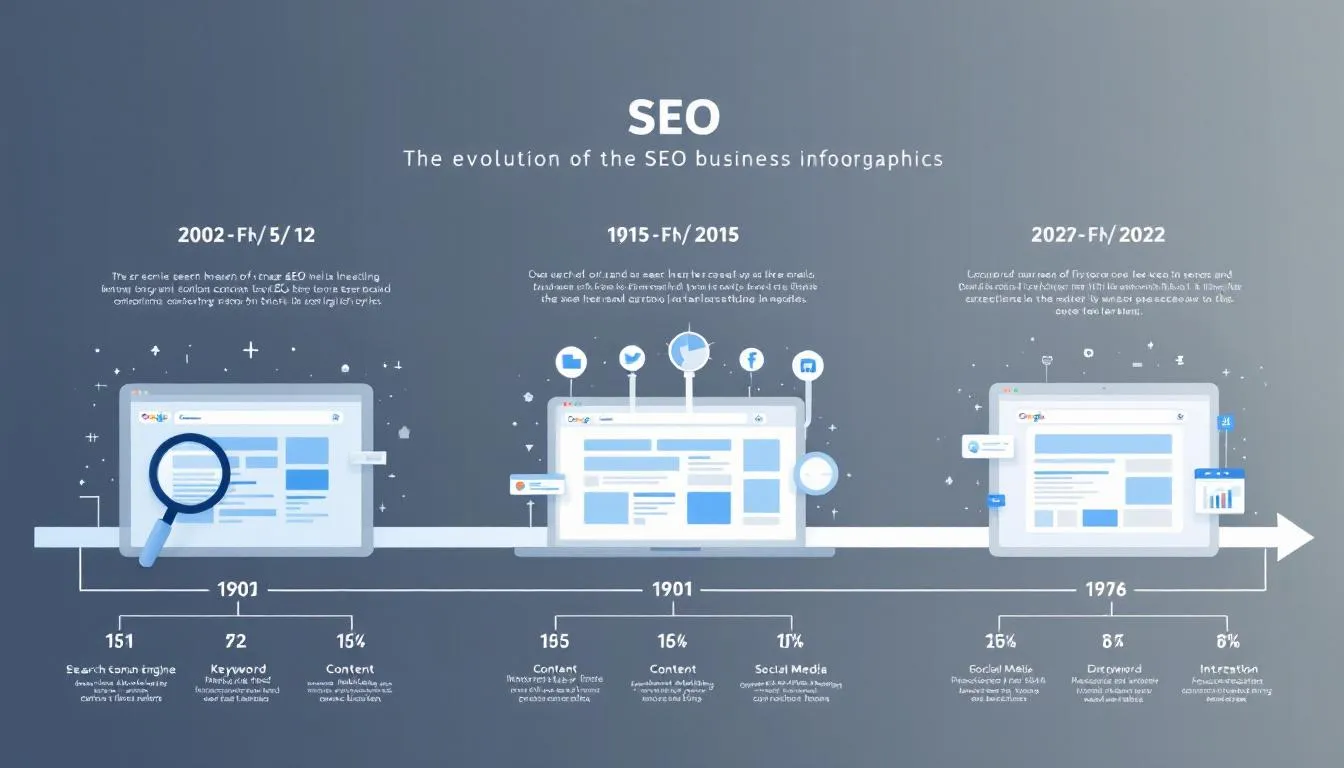Key Takeaways
- SEO has become a crucial component of digital marketing, offering a cost-effective alternative to paid ads while requiring businesses to continually adapt to industry changes.
- Success in the SEO business relies on a combination of technical skills, analytical abilities, and strong communication for effective client management.
- Building a solid business plan, understanding legal requirements, and implementing a robust marketing strategy are essential steps for establishing and scaling an SEO company.
Understanding the SEO Business Landscape

The SEO landscape is continually evolving, making it a critical component of modern business strategies. With search engines undergoing frequent updates, businesses must regularly adapt their local seo strategies to stay competitive and visible in organic search results. SEO is not only about improving rankings but also about understanding consumer intent through the data it generates, which can uncover new opportunities for brands. Seos can play a significant role in this process.
In recent years, SEO has proven to be more cost-effective than paid search ads, attracting clients based on targeted keywords without the ongoing expense of paid ads campaigns. As a result, most businesses now recognize the value of a good SEO strategy in enhancing their digital marketing efforts, making SEO a must-have in the current marketing dynamics.
Essential Skills for Running an SEO Business
Running a successful SEO business requires a blend of technical and soft skills. The core components of SEO include:
- Technical optimization: improving elements on the site that are not related to content, such as site speed and mobile-friendliness.
- On-page optimization: focusing on content and keyword usage.
- Off-page optimization: dealing with building backlinks and external signals.
Each component requires specific expertise.
Beyond technical skills, SEO professionals must also possess strong analytical abilities to interpret data and adjust strategies accordingly. Following Google’s E-E-A-T guidelines (Expertise, Authoritativeness, Trustworthiness) is crucial for creating content that resonates with audiences.
Additionally, soft skills like communication and strategic thinking are essential for effective client management and team dynamics.
Creating a Business Plan for Your SEO Company

A well-constructed business plan is the cornerstone of any successful SEO company. It defines the business, establishes goals, and outlines methods for achieving them. The executive summary should provide a brief overview of your SEO business and its potential for success. This section can be particularly compelling for attracting new partners and securing financing.
Your market analysis should include:
- The SEO industry outlook
- A detailed description of your target customers
- Conducting competitive analysis to identify your main competitors and assess their marketing and pricing strategies
- Highlighting opportunities in niche markets that competitors may overlook to gain a significant advantage
Finally, your business plan should include a robust marketing strategy outlining how you intend to reach and convert your target market into customers. Detail your financing plan, specifying your funding requirements and financial projections to ensure a clear path to profitability.
Choosing the Right Business Structure
Choosing the right business structure is a top priority for any new SEO company, as it affects your operations, taxes, and personal asset risk. Most businesses opt for either an LLC (Limited Liability Company) or an S corporation, each offering different benefits. An LLC provides personal liability protection while allowing flexibility in management and taxation. It generally faces fewer formalities and reporting obligations compared to S corporations, making it easier to manage.
On the other hand, an S corporation offers pass-through taxation, avoiding double taxation at the corporate level, but it has restrictions on the number and type of shareholders, which can limit ownership. The choice between an LLC and an S corporation depends on your specific needs, including the desired level of flexibility in management and ownership.
Legal Requirements for Starting an SEO Business
Understanding the legal requirements is essential when starting an SEO business. Most SEO companies must secure local or state business licenses and registrations based on their chosen business structure and location. If you plan to operate under an assumed name, a DBA (Doing Business As) filing is required in many jurisdictions.
For businesses structured as LLCs or corporations, consider the following requirements:
- Apply for an Employer Identification Number (EIN) if you plan to hire staff.
- Maintain separate finances between business and personal accounts to ensure compliance and protect personal assets.
- Obtain a home occupation permit if you are operating from home.
Essential SEO Tools for Business Operations

In the world of SEO, having the right tools is crucial for streamlining operations and achieving success. Some key tools include:
- Google Keyword Planner: A free tool ideal for researching paid keywords and includes forecasting features.
- Semrush: Provides extensive keyword data and allows for competitive analysis, though it can be overwhelming for beginners.
- KWFinder: Offers rich data, including keyword opportunities based on competition, despite its limited number of daily searches.
Key tools needed for tracking SEO performance include Google Search Console, Bing Webmaster Tools, and digital analytics software. These tools help track keyword performance, identify technical issues, and analyze search traffic and website traffic, making them vital for effective SEO strategy implementation.
Developing a Unique Selling Proposition (USP)
A unique selling proposition (USP) is essential for differentiating your SEO business in a crowded market. It clearly defines what makes your service offerings unique and why clients should choose you over competitors. A strong USP can create a distinctive position in the market, enabling pricing power and fostering customer loyalty.
To attract clients, it’s important to define and promote the specific benefits your business offers. This differentiation should be memorable and clear, helping customers quickly identify the unique value and valuable content you provide.
Enhancing your USP by appealing directly to your ideal customer demographic and incorporating a strong brand personality can further strengthen your market position.
Crafting an Effective SEO Service Agreement
An SEO service agreement is a critical document that outlines tasks, responsibilities, and protects both the business and its clients. The agreement should define the specific services, deliverables, and project timelines to prevent misunderstandings. Including refund and guarantee policies helps set client expectations regarding SEO outcomes.
It’s important to clearly communicate the following in an agreement:
- No guarantee for top rankings or continuous first-page presence can be made.
- Including a confidentiality clause protects sensitive information shared between the client and SEO provider.
- A clause for early termination allows either party to exit under specified conditions, ensuring protection from unwanted commitments.
Defining points of contact streamline operations communication and ensures clarity in interactions.
Implementing Data Privacy and Protection Practices
Implementing robust data privacy and protection practices is essential for building trust with clients and complying with regulations. The GDPR applies to any company targeting EU citizens, necessitating compliance regardless of the company’s location. Similarly, the CCPA grants consumers in California the right to know what personal data is collected and how it is used, requiring transparency from businesses.
Websites must acquire explicit user consent before implementing tracking technologies to comply with privacy regulations, especially when it involves third party sites and other sites. SEO strategies should minimize structured data collection to only essential information to align with privacy compliance best practices.
Implementing a robust cookie consent management system is crucial for ensuring compliance with privacy regulations. These practices are not only essential for legal compliance but also for building trust and credibility with clients.
Building Your SEO Team

Building a skilled SEO team is crucial for developing and executing effective SEO strategies. Key roles include:
- An in-house SEO manager, essential for developing a tailored strategy that aligns with your company’s goals.
- An outreach specialist, responsible for building and maintaining backlinks to enhance your website’s authority.
- SEO analysts, who play a key role in interpreting data and tracking performance to inform your SEO strategy.
Collaboration across various roles, including project managers, content teams, developers, and designers, is essential for a successful SEO team. SEO teams can be organized by specialization, where each member focuses on a specific aspect like technical SEO, content creation, or analytics, ensuring comprehensive expertise across the SEO landscape.
Strategies for Client Acquisition and Retention
Effective strategies for client acquisition and retention are vital for the sustainability of an SEO business. These strategies include:
- Search engine optimization, which attracts new customers by enhancing organic visibility in search results.
- Content marketing, which draws in clients by providing valuable information that engages the target audience.
- Utilizing email marketing, which allows for direct communication with potential customers, enhancing conversion chances and lead generation.
Strategies for business growth include:
- Engaging with potential customers through social media platforms to build relationships and broaden brand reach.
- Utilizing referral programs that capitalize on existing customers’ networks to attract new clientele through recommendations.
- Providing training in analytics and SEO practices to foster independence and capability within client teams.
Ongoing education is vital for informing clients about new opportunities and developments, helping ensure their long-term satisfaction.
Scaling Your SEO Business

Scaling an SEO business requires a systematic approach and careful planning. Integrating automated features in SEO workflows can enhance accuracy and expedite client feedback. However, running the business on autopilot can hinder productivity and growth opportunities, so it’s critical to scale operations cautiously. AI-driven SEO solutions can facilitate the automation of routine tasks, allowing teams to focus on strategic initiatives.
Effective scaling requires:
- Strengthening operations and hiring selectively.
- Providing outstanding customer service.
- Tightening onboarding and account management processes to handle more clients efficiently.
- Embracing iterative strategies and ongoing experimentation to optimize and stay relevant in the dynamic SEO landscape.
Tracking and Measuring SEO Performance
Tracking and measuring SEO performance is essential for evaluating the success of your strategies. Performance metrics outlined in the contract are critical for measuring the success of SEO efforts. Utilizing both Google Search Console and Google Analytics provides insights into how users find and interact with your website.
Search Console data focuses on how often your site appears in search results, while Google Analytics tracks user behavior once they land on your site. Key metrics include:
- Clicks in Search Console: the number of times users clicked on a link to your site from Google search results.
- Sessions in Google Analytics: the duration of user interaction with your site, beginning with a page view.
- Engagement rate: the percentage of sessions where users actively interact with your content.
To visualize SEO data effectively, tools like Looker Studio can integrate metrics from both Google Search Console and Google Analytics.
Staying Updated with SEO Industry Changes
Staying updated with SEO industry changes is crucial for maintaining competitiveness. Outdated SEO tactics will soon lose effectiveness, and new organic search opportunities will require practitioners to adapt. Constant monitoring and re-evaluation are essential for SEO to remain effective over time. SEO professionals must adapt to frequent adjustments in search algorithms to maintain their effectiveness.
Frequent updates from Google can significantly affect website rankings and higher rankings, requiring constant vigilance from SEO specialists. The rise of zero-click searches is changing how users interact with search results, necessitating adjustments in SEO strategies, including the use of featured snippets. Searching technologies like Google Multitask Unified Model (MUM) and Google Bard (Gemini) are shaping the future of search algorithms, impacting the overall mobile friendly search result landscape.
Staying aware of competitors’ tactics and the overall web environment is crucial for SEO specialists. GoodSolutions.tech can help you navigate these changes effectively. Visit www.goodsolutions.tech for expert guidance.
AI and SEO: Future Trends
The future of SEO is increasingly intertwined with artificial intelligence. AI impacts SEO in several ways:
- Automating keyword research and predicting future search trends, streamlining the optimization process.
- Google’s Search Generative Experience utilizes AI to combine traditional search results with instant, relevant answers.
- Providing deeper insights into user intent.
- Improving content personalization.
Integrating AI capabilities can improve content relevance and help align it more closely with user expectations. AI-driven SEO strategies are critical for adapting to rapid changes in search engine algorithms and user behavior.
Companies are expected to invest more in AI-driven SEO tools to support their digital marketing efforts and generate quality leads. GoodSolutions.tech can help you stay ahead with AI-enhanced SEO strategies. Visit www.goodsolutions.tech for more information.
Summary
Building a successful SEO business involves understanding the industry landscape, developing essential skills, and creating a solid business plan. Choosing the right business structure and adhering to legal requirements are foundational steps. Utilizing the right tools, crafting a strong USP, and implementing data privacy practices are essential for operational success. Building a skilled team and employing effective client acquisition and retention strategies are crucial for growth.
Scaling your business sustainably, tracking performance, and staying updated with industry changes are ongoing processes. Embracing AI and future trends will keep your business competitive. With dedication and strategic planning, you can thrive in the ever-evolving world of SEO.
Frequently Asked Questions
What are the most critical skills needed to run an SEO business?
To effectively run an SEO business, it is critical to possess technical SEO knowledge, strong analytical abilities, and effective communication and strategic thinking skills. Additionally, adhering to Google’s E-E-A-T guidelines for content creation is essential for success.
What legal requirements must be met to start an SEO business?
To establish an SEO business, you must obtain local or state business licenses, register your business appropriately, file a DBA if using an assumed name, acquire an EIN if employing staff, and ensure separate financial management for LLCs or corporations. These legal requirements are essential for compliance and operational integrity.
How do I develop a unique selling proposition (USP) for my SEO business?
To develop a unique selling proposition (USP) for your SEO business, define and accentuate what differentiates your services, emphasize the specific benefits you offer, and align your messaging with your target audience’s needs while showcasing a distinctive brand personality. This clarity will effectively communicate your value to potential clients.
What are some effective strategies for client acquisition and retention?
Implementing SEO and content marketing can significantly enhance your visibility and attract new clients. Additionally, leveraging email marketing, social media engagement, and referral programs, alongside ongoing education for clients, will help foster retention.
How can AI impact the future of SEO?
AI will significantly enhance SEO by automating keyword research, predicting search trends, and improving content creation while providing valuable insights into user intent. Adopting AI-driven strategies will be crucial for keeping pace with the evolving landscape of search engine algorithms and consumer behavior.
#StartSEOBusiness #GrowSEOBusiness #SEOBusinessPlan #SEOindustry #SEOSkills #TechnicalSEO #OnPageSEO #OffPageSEO #KeywordResearch #GoogleEEAT #CommunicationSkills #MarketAnalysis #TargetCustomers #CompetitiveAnalysis #MarketingStrategy #LLC #SCorporation #SEOlegal #BusinessLicenses #EIN #SEOtools #GoogleKeywordPlanner #Semrush #KWFinder #SearchConsole #USP #SEOagreement #DataPrivacy #GDPR #CCPA #BuildSEOteam #ClientAcquisition #ContentMarketing #EmailMarketing #ReferralPrograms #ScalingBusiness #AIinSEO #GoodSolutionsTech
